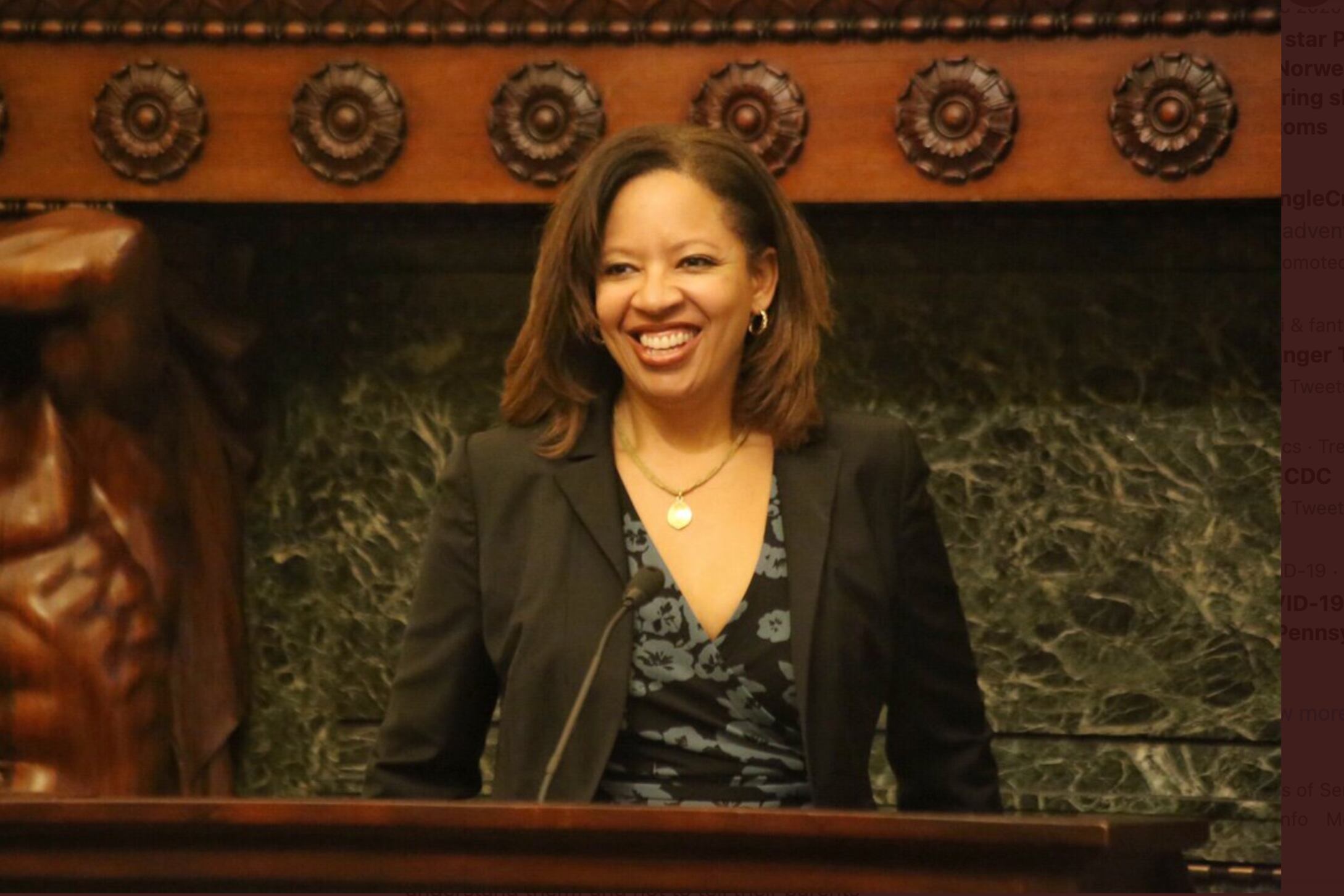Angela McIver was one of Mayor Jim Kenney’s picks to sit on Philadelphia’s Board of Education after the state-run School Reform Commission dissolved four years ago.
Since being on the board McIver has been credited with creating the “goals and guardrails” initiative to focus on student achievement. So it came as a surprise to many when McIver announced her resignation earlier this month during a board meeting. At the time, neither McIver nor board President Joyce Wilkerson gave a reason for her exit or disclosed what she’d be doing next.
“I had no friction with board president Joyce Wilkerson or Superintendent Hite,” McIver told Chalkbeat Tuesday. “The decision was really difficult for me because I was committed to staying on and seeing through the goals and guardrails that the board put in place. I’m a small business owner and my business really did suffer from the pandemic.”
The Texas-born, New Mexico-raised educator fell in love with Philadelphia and decided to stay after graduating from Hampton University. She later earned her doctorate from the University of Pennsylvania.
McIver founded the Trapezium Math Club, which helps children build foundational math skills through after-school programming. But due to the pandemic the program had to pivot and reimagine itself and start from scratch.
“We were an in-person hands on face-to-face program that rejected technology so we had to pivot to technology to offer math online and keep our philosophy about learning and keep it as technology free as possible,” McIver said. “We had to close our brick and mortar location. We could not keep it open and to stay in business, we had to pivot to an online model.”
Her departure comes just months after Kenney appointed three members: Lisa Salley, Reginald Streater, and Cecelia Thompson. Now the mayor will need to find another board replacement with schools reopening for in-person learning in a few weeks.
The mayor’s office told Chalkbeat it will work with the school board and other stakeholders and develop a timeline to reconvene the Educational Nominating Panel, which will submit names to Kenney for consideration for the vacant seat.
The city will provide an update, including a timeline, when the panel reconvenes and the nomination process begins, according to spokesperson Sarah Peterson.
McIver said she has no plans on coming to the district in a leadership capacity. “But I absolutely loved being on the board, so if I could come back in the future I would accept that position again.”
She spoke with Chalkbeat about her time on the board and how the governing body can be more effective for the city’s students.
This interview has been lightly edited for length and clarity.
The board unveiled its goals and guardrails last year to focus on student achievement. What would make this system of accountability successful?
Implementation would make the goals and guardrails effective. I think it was very clear that everyone knew my stance on the goals and guardrails. I don’t believe we should be focused so heavily on reading and math scores. My theory of action is if we provide and invest in students and schools in the guardrails then the other pieces take care of themselves. To move the needle in reading and math test scores, you create school environments where students and teachers and families love to be, you give children options of extracurricular and athletic programs that keep them connected to the school and invested in the school and invested in coming. If you create that then the reading and math scores are an easy thing to improve.
Teachers opposing the anti-critical race theory legislation in Harrisburg want the school board to take a stand. They want the board to say regardless of what happens in Harrisburg, that it is going to continue to encourage teachers to teach about racism and teach about the truth in the past of this country. Do you agree?
Yes, they should. Critical race theory is just teaching history. We know that so much of history was taken out to present a particular point of view. And critical race theory is simply teaching the full history and it’s being used as a ploy of people on the right. I don’t even think it merits much conversation. But I can’t imagine that the board would not back that.
Is the district in better hands under local control as compared to being governed by the state when it was under the School Reform Commission?
Absolutely, 100%. When it was under the SRC the decisions and actions that were being taken were simply financial ones. Under the locally controlled school board, everything that drives the decisions has to do with students — it’s student centered and focused on equity and having deep, meaningful conversations about how we make this happen for students.
How can the school board be more effective in the future? Thoughts on how the mayor selects members?
So I just want to say that Mayor Kenny has been completely hands off. I’ve been impressed by how he picked the board and then let the board do its work without interference. So that is a wonderful thing that he has done. I think the board itself has worked really well together. I think a nine-person board is a good number. We bring diversity of thought, there is a lot of camaraderie and understanding and acceptance of differences of opinion. There are some things that I disagreed with and I think the board should consider, and I think for instance, the speaker’s policy. I think we would be better off if we let whoever wants to speak, speak. I think we should revisit the speaker’s policy. That’s not news to any board members. They know how I have felt about it. We are a democratic entity. We speak for the people, we represent the people, we don’t speak for ourselves. As board members, we represent the community, then we should give the community an opportunity to speak their voice.
Is the charter renewal process fair for schools with little resources?
I think it’s difficult for charters with fewer resources to be successful. No, I don’t think the charter renewal process is fair. I think that prior to this charter renewal process, we didn’t have a system in place that allowed us to look at schools across the board. That being said, we know the charter school organizations that have very strong boards that have wealthy boards that can support them are at an advantage. And the unfortunate thing is that those schools that are run by people of color don’t have access to those kinds of resources that put them on an equal playing field.
So there’s something that needs to be fixed there. I don’t think it’s the charter renewal process that’s the problem. It’s that running charter schools requires far more than just the money that schools receive from the district. It makes running a charter school very difficult. I helped start a charter school. And I’ve had people ask me subsequently to be part of a startup for charter schools and I always tell them you don’t want another charter school. You think you’re going to be doing these amazing, wonderful things with children and creating these exciting education opportunities and what you’re doing is spending time figuring out how to get a permit for the dumpster that goes behind the school and figuring out how you’re going to get the resources to pay for cafeteria tables.
You’re not running a charter school, you’re running a business. I would encourage people who think that they want to move forward and do charter schools to really think very deeply about it. And I think the process for authorizing and monitoring charter schools is good in helping prevent these problems from happening before they even start.
Let’s reflect on your accomplishments on the board. What do you look back on and are most proud about?
I am proud about my guardrail for extracurricular and athletic opportunities. I really wanted to stay on the board just to push for this because I believe to my core that the issues that we’re dealing with when you have to help when you’re hiring more school safety officers, when you’re putting more money into school safety officers than you are into supports and resources and opportunities for kids. We are doing the wrong thing and I think that I have been very loud and very focused on that piece and I am very proud of that and hope that somebody on the board picks up that mantle and continues to fight for this.
I was also the one board member who voted against the budget. It really came down to one thing that we’re spending three times as much, that budget has three times as much money put towards school police officers than it does towards athletics. And to me that makes absolutely no sense. We are creating the problem right? It becomes self-fulfilling when you hire more officers, the messages that you’re sending to schools become self-fulfilling and how we allocate our resources. It really says everything about who we believe our children are, what we believe our children deserve.
Schools were forced to close last year due to COVID. When you look back, your thoughts on the school year that was through the pandemic and how it was managed?
I think it highlighted the sheer discrepancy in resources. We would not have changed what we did last year, but we need to really consider how we make significant changes in our infrastructure and capital investments so that if something like this were to happen again, if we were to shut down again, we wouldn’t have to shut everything down and keep students home. That was not ideal. It highlights a far bigger problem and that is how schools are funded in our state. I think this is a much larger issue and people who are committed to equity across the board, whether they are in Philadelphia or suburban schools should be fighting for equitable allocation of resources because it did not have happened. It did not. We should have had access to our resources, should have been what our suburban counterparts had, and we should have been able to and we couldn’t. It just highlights the disparity in resources for schools.
I hope we don’t have to shut down again. The school district really needs to be thinking 10 years, 20 years out in terms of what our Infrastructure is going to look like. So how are we going to address that? We need to have bigger conversations about that and be more proactive than reactive, which I think we’ve been for the past decade.





